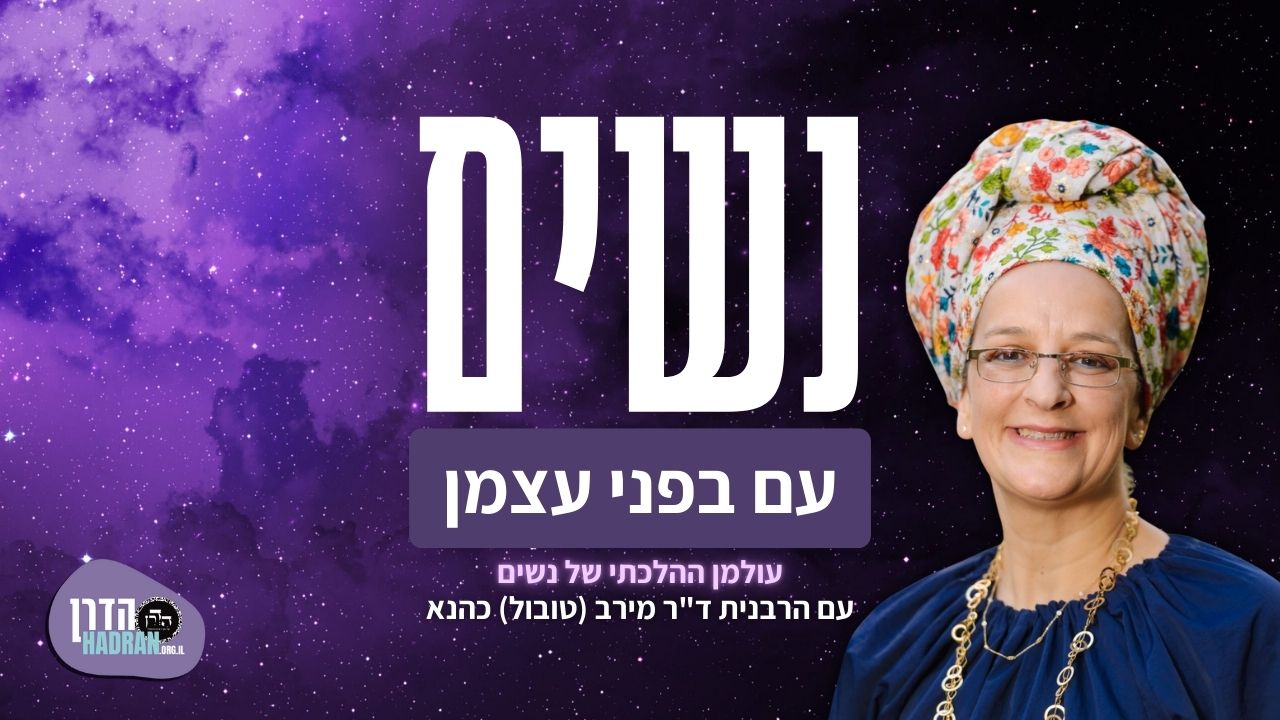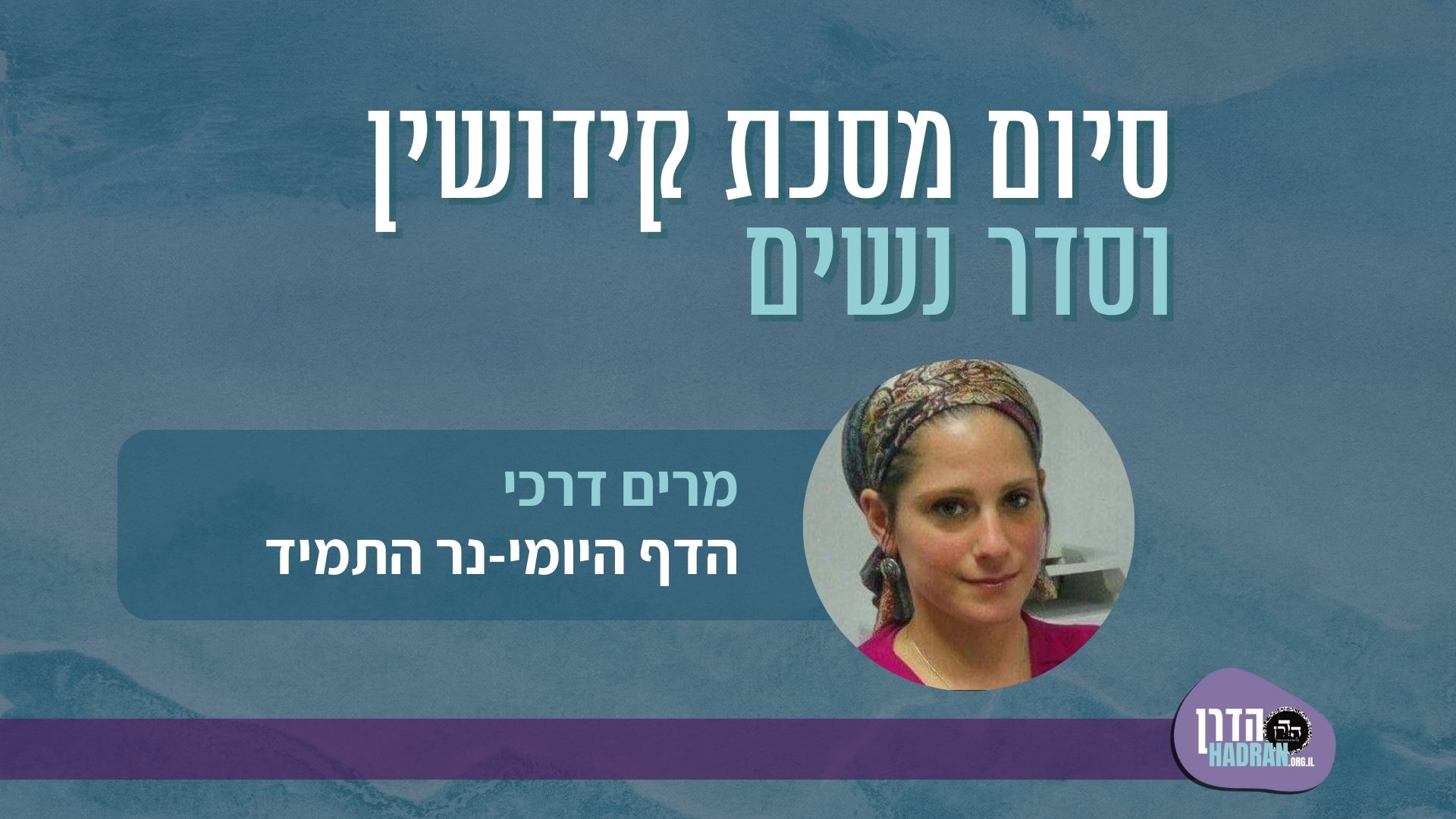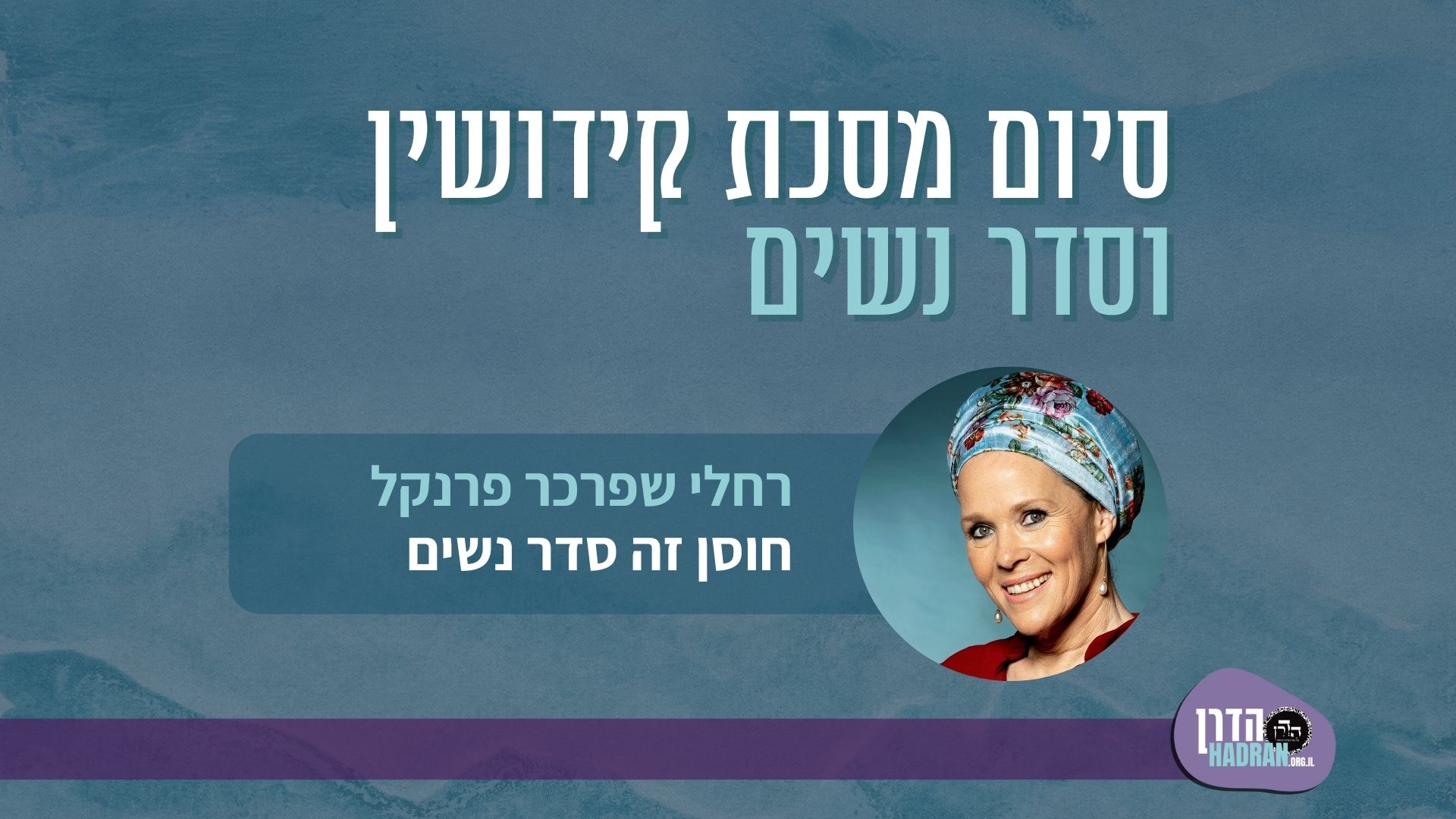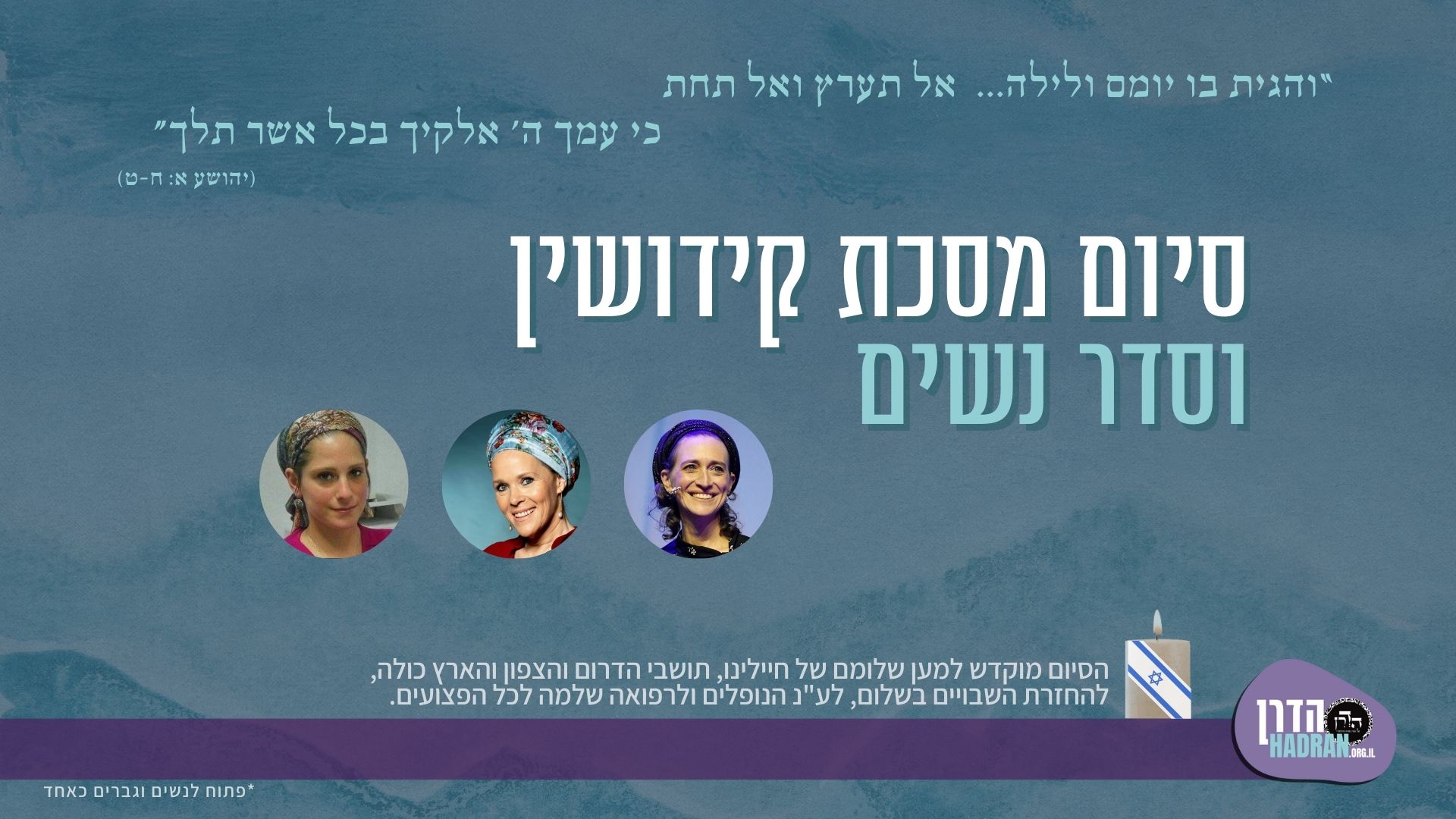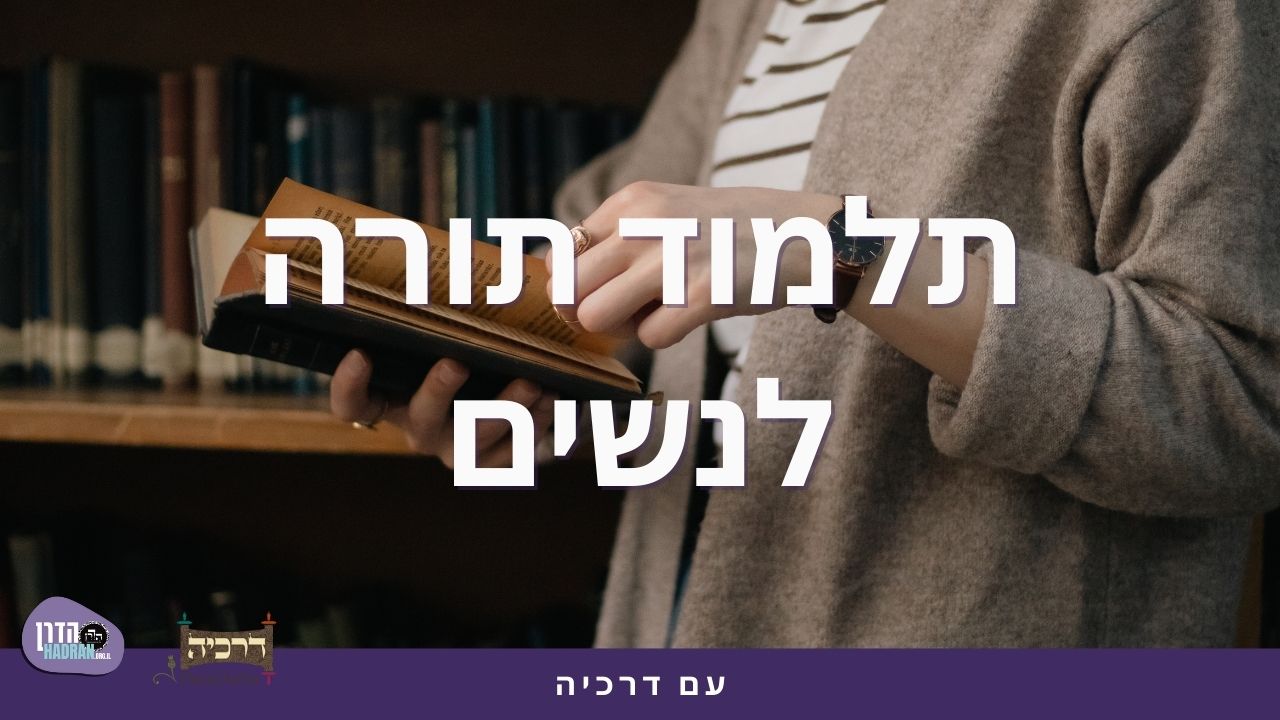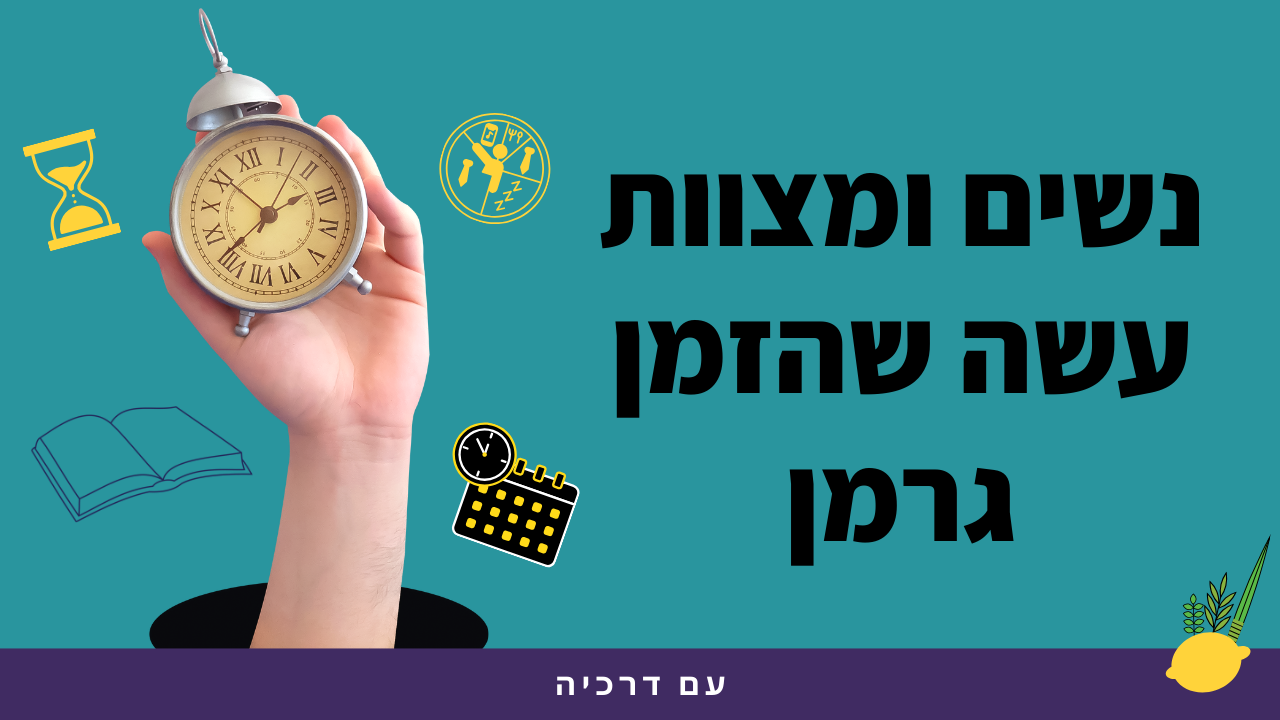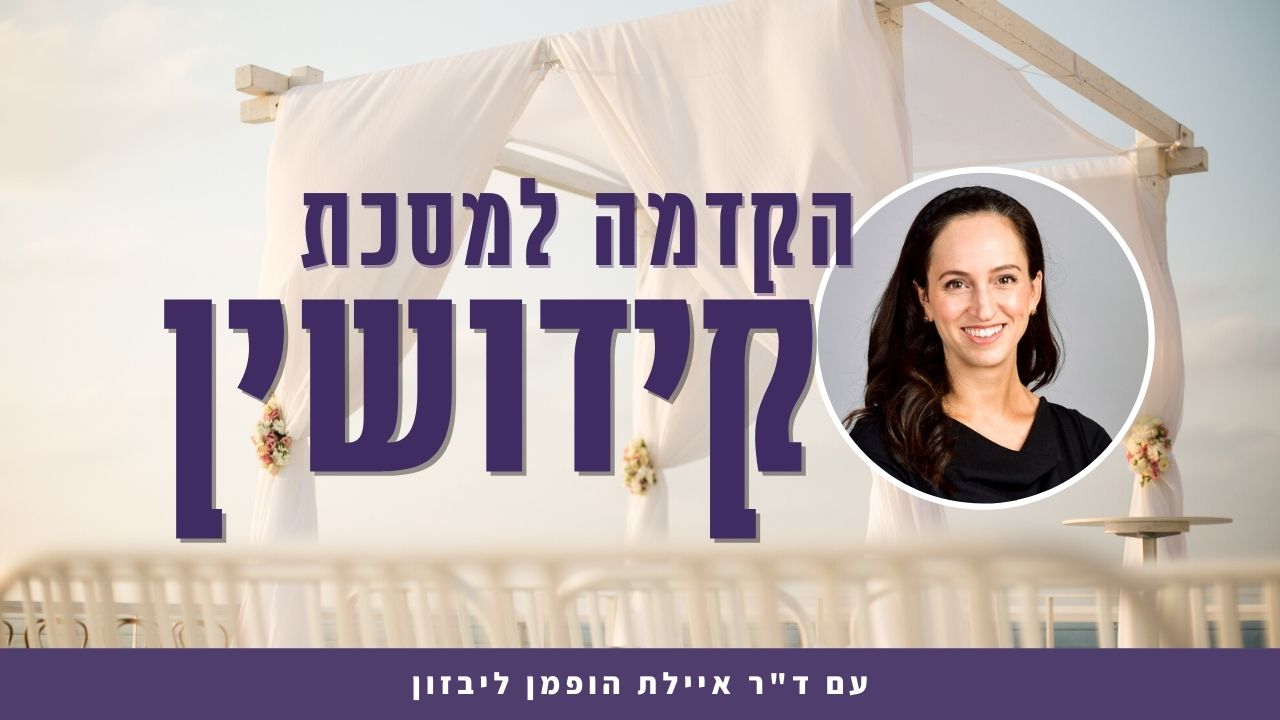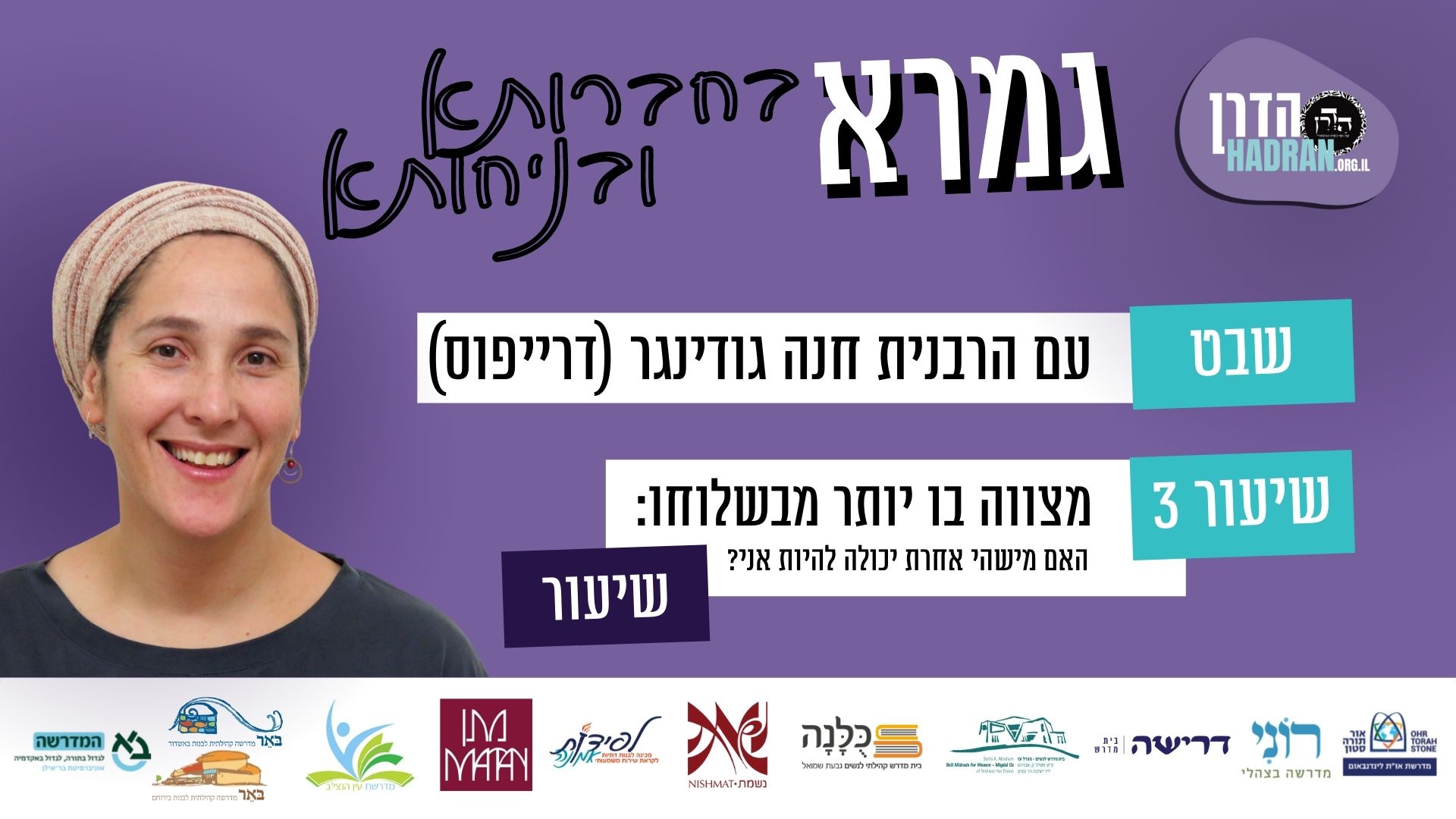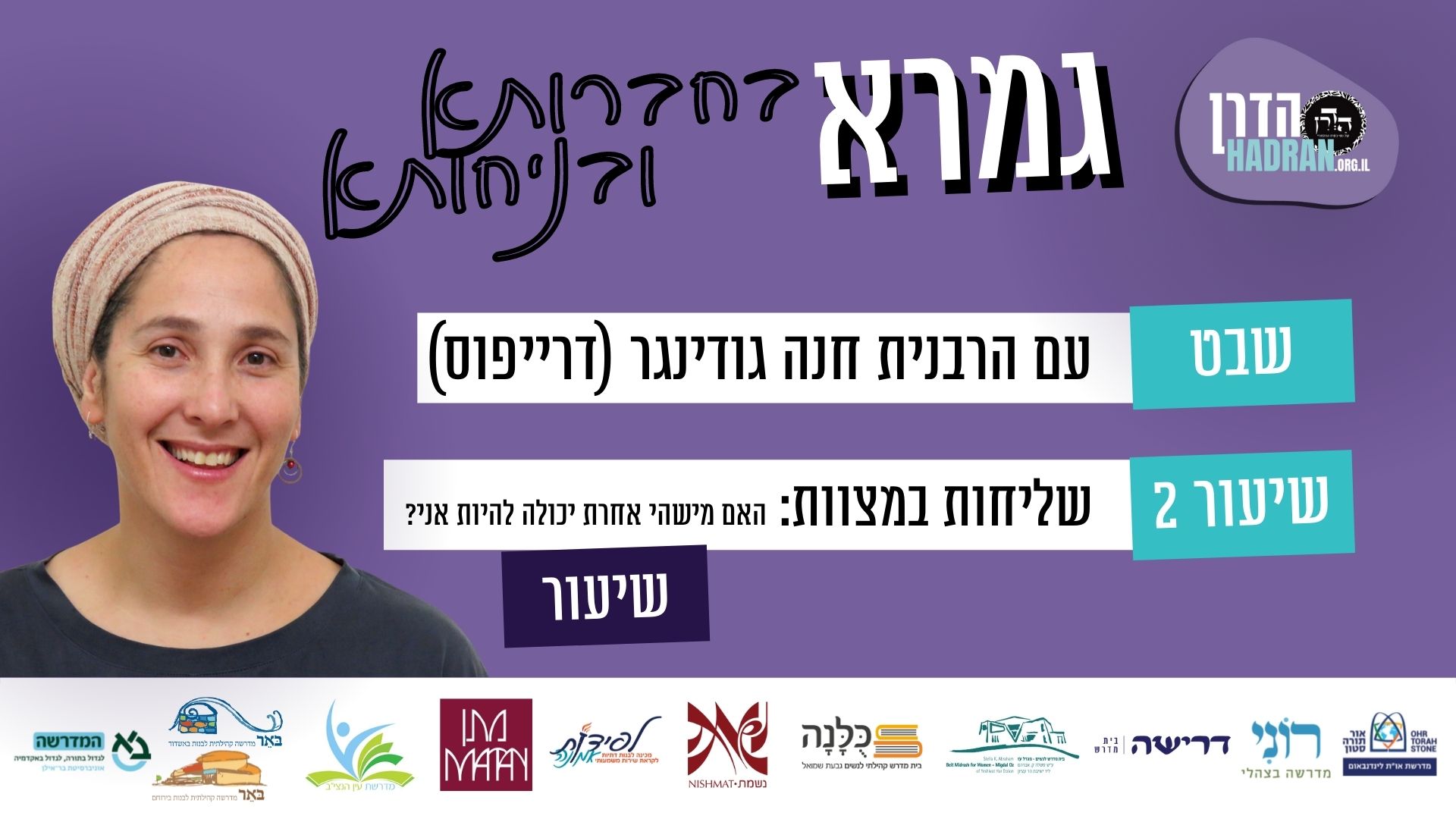הלימוד השבוע מוקדש ע”י משפחת הופסטטר-דיקר לע”נ אפרים בן קיילה וברוך.
הלימוד החודש מוקדש לרפואת פיליס הכט, גיטל פעשא בת מאשה רחל על ידי חברותיה הרבות שאוהבות ומעריכות אותה.
רוצה להקדיש שיעור?

כלים
הלימוד החודש מוקדש לרפואת פיליס הכט, גיטל פעשא בת מאשה רחל על ידי חברותיה הרבות שאוהבות ומעריכות אותה.
כלים
העמקה
רוצה להבין מה באמת קורה מתחת לפני השטח של הסוגיה?
שיעורים, פודקאסטים והרחבות של מיטב המורות שלנו יפתחו לך עוד זוויות וכיווני חשיבה.
חדשה בלימוד הגמרא?
זה הדף הראשון שלך? איזו התרגשות עצומה! יש לנו בדיוק את התכנים והכלים שיעזרו לך לעשות את הצעדים הראשונים ללמידה בקצב וברמה שלך, כך תוכלי להרגיש בנוח גם בתוך הסוגיות המורכבות ומאתגרות.
פסיפס הלומדות שלנו
גלי את קהילת הלומדות שלנו, מגוון נשים, רקעים וסיפורים. כולן חלק מתנועה ומסע מרגש ועוצמתי.
קידושין ח
אַף שָׁוֶה כֶּסֶף נָמֵי דְּקִיץ.
so too, an item worth money must be set, i.e., it must have a clearly defined value.
אָמַר רַב יוֹסֵף: מְנָא אָמֵינָא לַהּ, דְּתַנְיָא: ״מִכֶּסֶף מִקְנָתוֹ״ – בְּכֶסֶף הוּא נִקְנֶה, וְאֵינוֹ נִקְנֶה בִּתְבוּאָה וְכֵלִים.
Rav Yosef said: From where do I say this opinion? As it is taught in a baraita with regard to redeeming a Hebrew slave: “He shall give back the price of his redemption out of the money that he was bought for” (Leviticus 25:51), which indicates: He is acquired specifically through money and he is not acquired through grain or vessels.
הַאי תְּבוּאָה וְכֵלִים הֵיכִי דָמֵי? אִילֵּימָא דְּלָא מַקְנוּ בְּהוּ כְּלָל, ״יָשִׁיב גְּאֻלָּתוֹ״ אָמַר רַחֲמָנָא – לְרַבּוֹת שָׁוֶה כֶּסֶף כְּכֶסֶף;
Rav Yosef explains: What are the circumstances of these grains and vessels? If we say that a Hebrew slave cannot be acquired through them at all, as money alone may be used, the Merciful One states: “He shall give back the price of his redemption,” which serves to include all modes of repayment as valid equivalents of money, i.e., an item worth money is the same as money. There is no requirement to use money in particular; it is also possible to use items with monetary value.
וְאִי דְּלֵית בְּהוּ שָׁוֶה פְּרוּטָה, מַאי אִירְיָא תְּבוּאָה וְכֵלִים, אֲפִילּוּ כֶּסֶף נָמֵי! אֶלָּא לָאו דְּאִית בְּהוּ שָׁוֶה פְּרוּטָה, וְכֵיוָן דְּלָא קַיְיצִי לָא?
And if you say that they do not have the value of one peruta, why mention specifically grain and vessels? Even money that is not worth one peruta cannot be used for acquiring a slave. Rather, is it not speaking here about a case where the grain and vessels do have the value of one peruta, but since they lack a set value, no, a Hebrew slave cannot be redeemed with them? The comparison with money teaches that a Hebrew slave can be redeemed only with an item that has a clearly defined value, like money.
וְאִידָּךְ, הָכִי קָאָמַר: בְּתוֹרַת כֶּסֶף הוּא נִקְנֶה, וְאֵין נִקְנֶה בְּתוֹרַת תְּבוּאָה וְכֵלִים, וּמַאי נִינְהוּ – חֲלִיפִין.
And the other Sage, Rabba, who maintains that appraisal is not necessary, would respond: The tanna is referring to an item worth one peruta, but he is not teaching that one cannot redeem a slave with items whose value is not set. Rather, this is what he is saying: A Hebrew slave is acquired through the mode of money, and he is not acquired through the mode of grain or vessels. And what is this mode particular to the acquisition of grain and vessels? This is referring to symbolic exchange. A slave cannot be acquired through the mode of acquisition of symbolic exchange.
וּלְרַב נַחְמָן, דְּאָמַר: פֵּירוֹת לָא עָבְדִי חֲלִיפִין, מַאי אִיכָּא לְמֵימַר? אֶלָּא, לְעוֹלָם דְּלֵית בְּהוּ שָׁוֶה פְּרוּטָה. וּדְקָאָמְרַתְּ ״מַאי אִירְיָא תְּבוּאָה, וְכֵלִים אֲפִילּוּ כֶּסֶף נָמֵי!״, לָא מִיבַּעְיָא קָאָמַר:
The Gemara notes: This explanation is valid only according to those who say that grain can be acquired through the mode of exchange; but according to the opinion of Rav Naḥman, who said that produce cannot effect symbolic exchange, as this mode of acquisition applies only to vessels, what can be said? Why does the tanna mention grain if grain cannot be used in symbolic exchange? Rather, the Gemara rejects this explanation in favor of the following: Actually, this is referring to a case where the grain and utensils do not have the value of one peruta. And as for that which you said: Why mention specifically grain and vessels; even money that is not worth one peruta cannot acquire either, one could say that the tanna is speaking utilizing the style of: It is not necessary.
לָא מִיבַּעְיָא כֶּסֶף, דְּאִי אִית בֵּיהּ שָׁוֶה פְּרוּטָה – אִין, אִי לָא – לָא, אֲבָל תְּבוּאָה וְכֵלִים, אֵימָא מִדִּמְקָרְבָא הֲנָאָתַיְיהוּ, גָּמַר וּמַקְנֵי נַפְשֵׁיהּ, קָא מַשְׁמַע לַן.
The Gemara elaborates: It is not necessary to state with regard to money that if it has the value of one peruta, yes, one effects acquisition with it, and if not, then no, one cannot effect acquisition with it. But with regard to grain and vessels, one might say that as their benefit is readily available, i.e., one can enjoy them immediately in their current state, perhaps the slave decides and transfers ownership of himself to the master by even less than the worth of one peruta. Therefore, the tanna teaches us that an article less than the value of one peruta cannot effect acquisition notwithstanding the above reasoning.
אָמַר רַב יוֹסֵף: מְנָא אָמֵינָא לַהּ, דְּתַנְיָא: ״עֵגֶל זֶה לְפִדְיוֹן בְּנִי״, ״טַלִּית זֹה לְפִדְיוֹן בְּנִי״ – לֹא אָמַר כְּלוּם. ״עֵגֶל זֶה בְּחָמֵשׁ סְלָעִים לְפִדְיוֹן בְּנִי״, ״טַלִּית זוֹ בְּחָמֵשׁ סְלָעִים לְפִדְיוֹן בְּנִי״ – בְּנוֹ פָּדוּי.
Rav Yosef said: From where do I say that betrothal can be effected only with an item with a clearly defined value? As it is taught in a baraita (Tosefta, Bekhorot 6:4), that if one says to a priest: This calf should be for the redemption of my firstborn son, or: This cloak should be for the redemption of my firstborn son, then he has said nothing. But if he said: This calf worth the value of five sela should be for the redemption of my firstborn son, or: This cloak worth the value of five sela should be for the redemption of my firstborn son, then his son is redeemed.
הַאי פִּדְיוֹן, הֵיכִי דָמֵי? אִילֵּימָא דְּלָא שָׁוֵי, כֹּל כְּמִינֵּיהּ? אֶלָּא לָאו אַף עַל גַּב דְּשָׁוֵי, וְכֵיוָן דְּלָא קַיְיצִי – לָא?
The Gemara clarifies: What are the circumstances with regard to this redemption with a calf or a cloak that has no clearly defined value? If we say that they are not worth five sela, is it in his power to give a priest less than the established amount? Why would it even be considered that perhaps the son is redeemed? Rather, is it not referring to a case where even though they are worth this amount, one may not redeem with them in the case of the first clause since their value is not set? This shows that there is a difference between an item that has a set value and one that does not.
לָא, לְעוֹלָם דְּלָא שָׁוֵי, וּכְגוֹן דְּקַבֵּיל כֹּהֵן עִילָּוֵיהּ. כִּי הָא דְּרַב כָּהֲנָא שָׁקֵיל סוּדָרָא מִבֵּי פִּדְיוֹן הַבֵּן, אָמַר (לֵיהּ): לְדִידִי חֲזֵי לִי חָמֵשׁ סְלָעִים.
The Gemara rejects this suggestion: No; actually, this is referring to a case where the calf or cloak is not worth five sela, and the latter clause is referring to a case where the priest accepted upon himself to value the items as though they were worth this amount, which is why the son is redeemed. This is like this incident in which Rav Kahana, who was a priest, took a cloth [sudara] from the house of a man obligated to perform the redemption of his firstborn son. Rav Kahana said to the man: For me, I view this cloth as though it were worth five sela.
אָמַר רַב אָשֵׁי: לָא אֲמַרַן אֶלָּא כְּגוֹן רַב כָּהֲנָא, דְּגַבְרָא רַבָּה הוּא וּמִבְּעֵי לֵיהּ סוּדָרָא אַרֵישֵׁיהּ, אֲבָל כּוּלֵּי עָלְמָא – לָא. כִּי הָא דְּמָר בַּר רַב אָשֵׁי זְבַן סוּדָרָא מֵאִימֵּיהּ דְּרָבָא מִקּוּבֵּי שָׁוֵי עַשְׂרָה בִּתְלֵיסַר.
Rav Ashi said: We said that it is possible to redeem one’s son in this manner only when the priest is an individual such as Rav Kahana, who is a great man and is required to wear a cloth on his head. It was common practice for important people to wear a scarf on their heads. But with regard to everyone else, i.e., those who do not wear these cloths and cannot say it is worth that amount to them, no, they may not perform the redemption of the firstborn son in this manner. The Gemara cites a proof that a distinguished individual who needs a cloth will pay a large amount for one. This is like this incident in which Mar bar Rav Ashi bought a cloth from Rabba’s mother from Kovei for thirteen dinars, despite the fact that it was worth ten, because he needed a cloth.
אָמַר רַבִּי אֶלְעָזָר: ״הִתְקַדְּשִׁי לִי בְּמָנֶה״, וְנָתַן לָהּ דִּינָר – הֲרֵי זוֹ מְקוּדֶּשֶׁת, וְיַשְׁלִים. מַאי טַעְמָא? כֵּיוָן דְּאָמַר לַהּ ״מָנֶה״ וְיָהֵב לַהּ דִּינָר, כְּמַאן דְּאָמַר לַהּ: ״עַל מְנָת״ דָּמֵי.
§ Rabbi Elazar says: If a man said to a woman: Be betrothed to me with one hundred dinars, and he gave her one dinar out of the one hundred, she is betrothed immediately and he must subsequently complete the payment of the remainder of the amount he promised her. What is the reason for this? Since he said to her: Be betrothed to me with one hundred dinars, and yet he gave her only one dinar, he is like one who said to her: Be betrothed to me on the condition that I will give you one hundred dinars. In other words, he betroths her now with one dinar on the condition he will pay the remaining ninety-nine in the future. The betrothal therefore takes effect immediately, and he owes her the rest of the one hundred dinars.
וְאָמַר רַב הוּנָא אָמַר רַב: כׇּל הָאוֹמֵר ״עַל מְנָת״ כְּאוֹמֵר ״מֵעַכְשָׁיו״ דָּמֵי.
The Gemara adds: And this is in accordance with the opinion that Rav Huna says that Rav says: With regard to anyone who states a provision employing the phrase: On the condition, it is tantamount to his stipulating that the agreement take effect retroactively from now. An agreement stipulated by means of the phrase: On the condition, takes effect immediately. This is not like an ordinary agreement, which takes effect only after the condition has been fulfilled.
מֵיתִיבִי: ״הִתְקַדְּשִׁי לִי בְּמָנֶה״, וְהָיָה מוֹנֶה וְהוֹלֵךְ, וְרָצָה אֶחָד מֵהֶן לַחֲזוֹר אֲפִילּוּ בַּדִּינָר הָאַחֲרוֹן – הָרְשׁוּת בְּיָדוֹ.
The Gemara raises an objection from a baraita (Tosefta 2:10). If a man says to a woman: Be betrothed to me with one hundred dinars, and while he was counting the money, one of them wanted to retract the betrothal, it is in the power of either of them to do so even when only the last dinar remains to be given. This indicates that the betrothal does not take effect until the entire one hundred dinars has been paid.
הָכָא בְּמַאי עָסְקִינַן, דְּאָמַר ״בְּמָנֶה זֶה״. הָא מִדְּסֵיפָא ״בְּמָנֶה זֶה״, רֵישָׁא בְּמָנֶה סְתָם,
The Gemara answers: With what are we dealing here? This is a case where he says to the woman: Be betrothed to me with this one hundred dinars. In this case the entire one hundred dinars, not just the first dinar, constitutes the betrothal money. The Gemara raises a difficulty with this answer: From the fact that the latter clause of the baraita uses the expression: With this one hundred dinars, it can be inferred that the first clause is dealing with an unspecified one hundred dinars.
דְּקָא תָנֵי סֵיפָא: אָמַר לָהּ ״הִתְקַדְּשִׁי לִי בְּמָנֶה זֶה״ וְנִמְצָא מָנֶה חָסֵר דִּינָר, אוֹ דִּינָר שֶׁל נְחֹשֶׁת – אֵינָהּ מְקוּדֶּשֶׁת. דִּינָר רַע – הֲרֵי זוֹ מְקוּדֶּשֶׁת, וְיַחְלִיף.
As it is taught in the latter clause of that baraita, if he said to a woman: Be betrothed to me with this one hundred dinars, and it was found to be one hundred dinars less a dinar, or if it included a dinar of copper instead of silver, she is not betrothed. If one of the dinars was found to be a flawed dinar, i.e., it was a silver dinar but it was so worn that it would not be universally accepted, she is betrothed, and he must exchange that dinar for a different one. Since the latter clause of the baraita emphasizes the term: This one hundred dinars, evidently the first clause of the baraita must be referring to an unspecified one hundred dinars.
לָא, רֵישָׁא וְסֵיפָא דְּאָמַר ״בְּמָנֶה זֶה״, וּפָרוֹשֵׁי קָא מְפָרֵשׁ: רָצָה אֶחָד מֵהֶן לַחֲזוֹר, אֲפִילּוּ בְּדִינָר הָאַחֲרוֹן – הָרְשׁוּת בְּיָדוֹ. כֵּיצַד – כְּגוֹן דְּאָמַר לַהּ ״בְּמָנֶה זוֹ״.
The Gemara rejects this opinion: No; one can say that the first clause and the latter clause are both referring to a case where he said: With this one hundred dinars, and the latter clause is explaining the first clause, as follows: If one of them wishes to retract the betrothal, it is in the power of either of them to do so even when only the last dinar remains to be given. How so? This is referring to a case where he said to her: With this one hundred dinars.
וְהָכִי נָמֵי מִסְתַּבְּרָא, דְּאִי סָלְקָא דַעְתָּךְ רֵישָׁא בְּמָנֶה סְתָם, הַשְׁתָּא בְּמָנֶה סְתָם לָא הָווּ קִידּוּשֵׁי, ״בְּמָנֶה זֶה״ מִיבַּעְיָא?
The Gemara comments: And so too, it is reasonable to explain the baraita this way, as, if it enters your mind that the first clause is referring to an unspecified one hundred dinars, consider the following: Now if it is not a betrothal in a case involving an unspecified one hundred dinars, and she can retract her agreement to the betrothal, is it necessary to say that she can retract it when he says: With this one hundred dinars? If that were the correct interpretation of the first clause, the ruling in the last clause would be unnecessary.
אִי מִשּׁוּם הָא לָא אִירְיָא – תְּנָא סֵיפָא לְגַלּוֹיֵי רֵישָׁא, שֶׁלֹּא תֹּאמַר רֵישָׁא ״בְּמָנֶה זֶה״, אֲבָל בְּמָנֶה סְתָם הָווּ קִידּוּשִׁין, תְּנָא סֵיפָא ״בְּמָנֶה זֶה״, מִכְּלָל דְּרֵישָׁא בְּמָנֶה סְתָם, וַאֲפִילּוּ הָכִי לָא הָווּ קִידּוּשִׁין.
The Gemara rejects this proof: If it is due to that reason, there is no conclusive argument, i.e., the proof of the argument is inconclusive. The reason is that one could say that the tanna taught the latter clause to reveal the meaning of the first clause. The function of the latter clause is not to teach a novel halakha, but to preempt a mistaken reading of the first clause. The latter clause was stated so that you should not mistakenly say that the first clause is referring only to a situation when he said: With this one hundred dinars, but in a case of an unspecified one hundred dinars, it would be a betrothal. Therefore, the tanna taught in the latter clause: With this one hundred dinars, which teaches by inference that the first clause is referring to an unspecified one hundred dinars, and even so it is not a betrothal. Although this proof is rejected, the Gemara remains with its explanation that the first clause is referring to a case where he said to her: With this one hundred dinars.
רַב אָשֵׁי אָמַר: מוֹנֶה וְהוֹלֵךְ שָׁאנֵי, דְּדַעְתַּהּ אַכּוּלֵּיהּ.
Rav Ashi said: It is unnecessary to explain that the first clause of the baraita is referring to a case where he said: With this one hundred dinars, as a situation where he was counting the money is different. The reason is that she has the entirety of the one hundred dinars in mind, and therefore she will not be content with some of the money. His continuous action indicates that they both expect that he will give her the entire one hundred dinars, and consequently both parties can retract their agreement until he finishes counting.
הַאי דִּינָר שֶׁל נְחֹשֶׁת, הֵיכִי דָמֵי? אִי דְּיָדְעָה בֵּיהּ – הָא סְבַרָה וְקַבִּלָה! לָא צְרִיכָא, דְּיַהֲבֵיהּ נִיהֲלַיהּ בְּלֵילְיָא, אִי נָמֵי דְּאִשְׁתְּכַח לַיהּ בֵּינֵי זוּזֵי.
The Gemara further analyzes the baraita: What are the circumstances of this copper dinar mentioned here? If she knows that it is a copper dinar, she knew and accepted this coin as a dinar. If so, she cannot later retract her betrothal. The Gemara answers: No; it is necessary in a case where he gave her this dinar at night and at the time she did not see that it was copper. Alternatively, it was found among the other dinars, and she did not notice that one of them one was copper.
הַאי דִּינָר רַע הֵיכִי דָמֵי? אִי דְּלָא נָפֵיק – הַיְינוּ דִּינָר שֶׁל נְחֹשֶׁת! אָמַר רַב פָּפָּא: כְּגוֹן דְּנָפֵיק עַל יְדֵי הַדְּחָק.
The Gemara further asks: What are the circumstances of this flawed dinar, also mentioned in the baraita? If it cannot be spent, i.e., it cannot pass as a silver dinar, this is exactly like a copper dinar, as it too is not worth a full dinar. Rav Pappa said: This is referring to a case where the dinar can be spent with difficulty, i.e., it is difficult, but not impossible, to find someone who will accept it.
אָמַר רָבָא אָמַר רַב נַחְמָן: אָמַר לַהּ ״הִתְקַדְּשִׁי לִי בְּמָנֶה״, וְהִנִּיחַ לָהּ מַשְׁכּוֹן עֲלֵיהֶ[ם] – אֵינָהּ מְקוּדֶּשֶׁת,
§ Rava says that Rav Naḥman says: If one said to a woman: Be betrothed to me with one hundred dinars, and instead of giving it to her he gave her collateral for the money, she is not betrothed.
מָנֶה אֵין כָּאן – מַשְׁכּוֹן אֵין כָּאן. אֵיתִיבֵיהּ רָבָא לְרַב נַחְמָן: קִידְּשָׁה בְּמַשְׁכּוֹן מְקוּדֶּשֶׁת! הָתָם בְּמַשְׁכּוֹן דַּאֲחֵרִים וְכִדְרַבִּי יִצְחָק.
There is no one hundred dinars here, as he has not yet given her one hundred dinars, and there is no collateral here, since this collateral is not a gift but merely a security. He has therefore not given her anything. Rava raised an objection to Rav Naḥman from the following baraita: If he betrothed her with collateral, she is betrothed. The Gemara answers: There, it is referring to collateral belonging to other people, which was in the possession of the man who betrothed her, and this is in accordance with the opinion of Rabbi Yitzḥak.
דְּאָמַר רַבִּי יִצְחָק: מִנַּיִן לְבַעַל חוֹב שֶׁקּוֹנֶה מַשְׁכּוֹן – שֶׁנֶּאֱמַר: ״וּלְךָ תִּהְיֶה צְדָקָה״ – אִם אֵינוֹ קוֹנֶה, צְדָקָה מִנַּיִן? מִכָּאן לְבַעַל חוֹב שֶׁקּוֹנֶה מַשְׁכּוֹן.
As Rabbi Yitzḥak says: From where is it derived that a creditor acquires collateral, i.e., that the individual in possession of the collateral has the actual rights to it? As it is stated: “You shall surely restore him the pledge when the sun goes down that he may sleep in his garment, and bless you; and it shall be righteousness to you” (Deuteronomy 24:13). If the creditor does not acquire the pledge or collateral, from where does this considering his return of the collateral as righteousness stem? The creditor is not giving an item belonging to him; why is this considered a righteous act? Rather, from here it is derived that a creditor acquires collateral to a certain extent.
בְּנֵי רַב הוּנָא בַּר אָבִין זְבוּן הָהִיא אַמְתָּא בִּפְרִיטֵי, לָא הֲווֹ בַּהֲדַיְיהוּ, אוֹתִיבוּ נְסָכָא עֲלֵיהּ. לְסוֹף אִיַּיקַּר אַמְתָּא. אֲתוֹ לְקַמֵּיהּ דְּרַבִּי אַמֵּי, אֲמַר לְהוּ: פְּרִיטֵי אֵין כָּאן, נְסָכָא אֵין כָּאן.
The Gemara relates: The sons of Rav Huna bar Avin bought a certain maidservant on the condition that they would pay with copper perutot. They did not have the money at the time, and therefore they gave a piece of silver [naskha] for her as collateral. Ultimately, the price of the maidservant increased and the sellers wanted to cancel the sale. They came before Rabbi Ami for his ruling and he said to them: There are no perutot here, and there is no piece of silver here either. There was no valid act of acquisition at all because they did not actually give the money, and the collateral does not transfer ownership.
תָּנוּ רַבָּנַן: ״הִתְקַדְּשִׁי לִי בְּמָנֶה״, נְטָלַתּוּ וּזְרָקַתּוּ לַיָּם אוֹ לָאוּר אוֹ לְכׇל דָּבָר הָאָבֵד – אֵינָהּ מְקוּדֶּשֶׁת. הָא שְׁדֵיתִינְהוּ קַמֵּיהּ – הָווּ קִידּוּשִׁין? הָא קָאָמְרָה לֵיהּ: שְׁקֵיל, לָא בָּעֵינָא!
§ The Sages taught in a baraita (Tosefta 2:9): If a man said to a woman: Be betrothed to me with one hundred dinars, and she took it from his hand and threw it into the sea, or into the fire, or into anything that destroys, she is not betrothed. The Gemara expresses surprise at this ruling: The baraita indicates that she is not betrothed only if the one hundred dinars are destroyed, but if she threw the coins before him but did not destroy them, that is a betrothal. Why should this be? By throwing the coins at him she is effectively saying to him: Take this; I do not want your betrothal.
לָא מִיבַּעְיָא קָא אָמַר: לָא מִיבַּעְיָא שְׁדֵיתִינְהוּ קַמֵּיהּ דְּלָא הָווּ קִידּוּשִׁין, אֲבָל זְרָקַתּוּ לַיָּם אוֹ לָאוּר אֵימָא כֵּיוָן דְּמִיחַיְּיבָא בְּהוּ, קַדּוֹשֵׁי קַדִּישׁ נַפְשָׁהּ, וְהָא דְּקָא עָבְדָא הָכִי, סָבְרָא: אֶיבְדְּקֵיהּ לְהַאי גַּבְרָא אִי רַתְחָנָא הוּא אוֹ לָא, קָא מַשְׁמַע לַן.
The Gemara answers: The tanna of the baraita is speaking using the style of: It is not necessary, as follows: It is not necessary to state in a case where she throws the money before him that it is not a betrothal, as her action indicates that she does not want to be betrothed. But when she throws it into the sea or into the fire, one might say that since she is obligated to pay for the money he gave her, perhaps she betrothed herself with the money she received. And as for the reason why she did this act of destroying the money, she thought: I will test this man to see if he is an individual of an angry temperament or not. Therefore, the tanna teaches us that even in that case it is not a betrothal.
תָּנוּ רַבָּנַן: ״הִתְקַדְּשִׁי לִי בְּמָנֶה״ – ״תְּנֵם, לְאַבָּא וּלְאָבִיךָ״ – אֵינָהּ ״מְקוּדֶּשֶׁת. ״עַל מְנָת שֶׁיְּקַבְּלוּם לִי״ – מְקוּדֶּשֶׁת.
The Sages taught in a baraita (Tosefta 2:9): If a man said to a woman: Be betrothed to me with one hundred dinars, and she said to him: Give the money to my father, or: Give the money to your father, she is not betrothed. If she said: Give the money to my father, or Give the money to your father on the condition that he accepts them for me, she is betrothed.
תְּנָא אַבָּא לְהוֹדִיעֲךָ כֹּחַ דְּרֵישָׁא, תְּנָא אָבִיךָ לְהוֹדִיעֲךָ כֹּחַ דְּסֵיפָא.
The Gemara comments: The baraita taught the case where she said: Give the money to my father, to convey the far-reaching nature of the halakha of the first clause. If she simply said that he should give the money to anybody else, even her own father, whom it can be assumed she wants to benefit, she is still not betrothed. And the baraita taught the case where she said: Give the money to your father, to convey the far-reaching nature of the halakha of the latter clause. If she said that someone else should receive the money on her behalf, it is a valid betrothal even if she said the money should be given to his father.
״הִתְקַדְּשִׁי לִי בְּמָנֶה״ – ״תְּנֵם לִפְלוֹנִי״ – אֵינָהּ מְקוּדֶּשֶׁת. ״עַל מְנָת שֶׁיְּקַבְּלֵם לִי״ – מְקוּדֶּשֶׁת. וּצְרִיכָא,
The Gemara cites a similar case. If he said to her: Be betrothed to me with one hundred dinars, and she said to him: Give them to so-and-so, she is not betrothed. But if she said to him: On the condition that he accepts them for me, she is betrothed. The Gemara comments: It is necessary to issue this ruling, despite the fact that it is apparently identical to the previous halakha.
דְּאִי אַשְׁמְעִינַן ״אַבָּא וְאָבִיךְ״, הָתָם הוּא דְּכִי אָמְרָה ״עַל מְנָת שֶׁיְּקַבְּלוּם לִי״ – הָווּ קִידּוּשִׁין, דְּסָמְכָה דַּעְתַּהּ עִילָּ[וַ]יְהוּ, סָבְרָה: עָבְדִין לִי שְׁלִיחוּתַאי. אֲבָל פְּלוֹנִי – לָא,
The Gemara elaborates: This is because if the tanna had taught us only the case where she said: Give the money to my father, or: Give the money to your father, one would say that it is in that case there, when she said: On the condition that one of these relatives accepts them for me, that it is a betrothal, as she relies on them and she thinks: They will do my bidding for me and will hold this money on my behalf. But if she says: Give it to so-and-so, someone who is not related to either of them, no, the betrothal is not valid.
וְאִי אַשְׁמְעִינַן פְּלוֹנִי, הָכָא הוּא דְּכִי אַמְרַהּ ״תְּנֵם לִפְלוֹנִי״ – לָא הָווּ קִידּוּשֵׁי, דְּלָא מְקָרְבָא דַּעְתַּהּ לְגַבֵּיהּ לְמִיתְּבֵהּ לֵיהּ בְּמַתָּנָה, אֲבָל ״אַבָּא וְאָבִיךְ״, דִּמְקָרְבָא דַּעְתַּהּ לְגַבַּיְיהוּ, אֵימָא בְּמַתָּנָה יַהֲבִיתֵיהּ נִיהֲלַיְיהוּ, צְרִיכָא.
And conversely, if the tanna had taught us only the case of so-and-so, one might say: It is here, when she said: Give it to so-and-so, that it is not a betrothal, as she is not close to him and is not interested in giving him this money as a gift. But if she said: Give the money to my father, or: Give the money to your father, to whom she is close, one might say that she gave it to them as a gift, i.e., she accepted the sum as her betrothal money and decided to give it as a gift. If so, she should be betrothed. It was therefore necessary for the tanna to issue both rulings and clarify that she is not betrothed in either case.
תָּנוּ רַבָּנַן: ״הִתְקַדְּשִׁי לִי בְּמָנֶה״ – ״תְּנֵם עַל גַּבֵּי סֶלַע״ – אֵינָהּ מְקוּדֶּשֶׁת. וְאִם הָיָה סֶלַע שֶׁלָּהּ – מְקוּדֶּשֶׁת. בָּעֵי רַב בִּיבִי: סֶלַע שֶׁל שְׁנֵיהֶם, מַהוּ? תֵּיקוּ.
The Sages taught: If a man said to a woman: Be betrothed to me with one hundred dinars, and she said to him: Place them on a rock, she is not betrothed. And if the rock was hers, she is betrothed. Rav Beivai raises a dilemma: If the rock was the property of both of them, what is the halakha? No answer was found, and the Gemara states that the dilemma shall stand unresolved.
״הִתְקַדְּשִׁי לִי בְּכִכָּר״ – ״תְּנֵהוּ לְכֶלֶב״ – אֵינָהּ מְקוּדֶּשֶׁת. וְאִם הָיָה כֶּלֶב שֶׁלָּהּ – מְקוּדֶּשֶׁת. בָּעֵי רַב מָרִי: כֶּלֶב רָץ אַחֲרֶיהָ, מַהוּ?
The Gemara discusses a similar case. If a man said to a woman: Be betrothed to me with a loaf of bread, and she said to him: Give it to a dog, she is not betrothed. And if this dog was hers, she is betrothed. Rav Mari raises a dilemma: If a dog was chasing her to bite her, and she said to him: Give the loaf to the dog, what is the halakha?
בְּהָהוּא הֲנָאָה דְּקָא מַצְּלָה נַפְשָׁהּ מִינֵּיהּ גָּמְרָה וּמַקְנְיָא לֵיהּ נַפְשָׁהּ, אוֹ דִלְמָא מָצֵי אָמְרָה לֵיהּ: ״מִדְּאוֹרָיְיתָא חַיּוֹבֵי מְחַיְּיבַתְּ לַאֲצוּלַן״? תֵּיקוּ.
The Gemara presents the two sides of the dilemma: Does one say that she commits herself to betrothal and transfers herself to him through this benefit that she receives by being rescued from the dog? Or perhaps she can say to him: By Torah law you are required to rescue me, due to the injunction: “Neither shall you stand idly by the blood of your neighbor” (Leviticus 19:16), and therefore she is not betrothed with the loaf because she does not owe him anything. This problem is also left unanswered, and the Gemara again states that the dilemma shall stand unresolved.
״הִתְקַדְּשִׁי לִי בְּכִכָּר״ – ״תְּנֵהוּ לְעָנִי״ – אֵינָהּ מְקוּדֶּשֶׁת, אֲפִילּוּ עָנִי הַסָּמוּךְ עָלֶיהָ. מַאי טַעְמָא? אָמְרָה לֵיהּ: כִּי הֵיכִי דִּמְחַיַּיבְנָא בֵּיהּ אֲנָא, הָכִי מְחַיְּיבַתְּ בֵּיהּ אַתְּ.
If a man said to a woman: Be betrothed to me with a loaf of bread, and she said: Give it to a poor person, she is not betrothed, even if it was a poor person who is dependent upon her, i.e., a poor person who regularly receives food from that woman. What is the reason for this? She could say to him: Just as I am required to give charity to him, so too you are required to give charity to him. Therefore, this donation is not an indication that she has agreed to the betrothal.
הָהוּא גַּבְרָא דַּהֲוָה קָא מְזַבֵּין
The Gemara relates: There was a certain man who was selling
